Turtles are fascinating creatures, and having one as a pet can be a rewarding experience. But like any pet, turtles require proper care to stay healthy. Knowing about common turtle diseases and how to prevent them is key to keeping your shelled friend happy and thriving. This guide aims to help turtle owners understand, recognize, and treat common ailments, ensuring a long and healthy life for their pets.
Understanding Common Turtle Diseases
Metabolic Bone Disease
Metabolic Bone Disease (MBD) is a serious condition often seen in turtles due to a lack of calcium or vitamin D3. This deficiency can lead to a soft shell, broken bones, and general weakness. Proper UVB lighting and a diet rich in calcium are crucial to prevent this disease. Young turtles are particularly vulnerable, so it’s essential to ensure they have access to natural sunlight or artificial UVB light sources. Calcium supplements can also help maintain their health.

Vitamin A Deficiency
Vitamin A deficiency is another common issue in turtles, often resulting in swollen eyes, respiratory infections, and even abscesses. To prevent this, provide a varied diet that includes foods rich in vitamin A, like carrots and leafy greens. In the past, this condition was more prevalent when turtles were fed unsupplemented diets consisting of beef or chicken. Now, with the availability of complete pelleted turtle diets, it’s easier to ensure they get the necessary nutrients.

Shell Infections
Shell infections, or “shell rot,” can occur due to poor water quality or injuries. These infections are usually caused by bacteria or fungi entering the shell’s layers. To prevent shell infections, maintain a clean habitat with proper filtration and ensure your turtle has a safe environment to avoid injuries. Regularly check the shell for any soft spots or discoloration, as these can be early signs of infection. Keeping an eye on water quality is vital, as dirty water can exacerbate these issues.
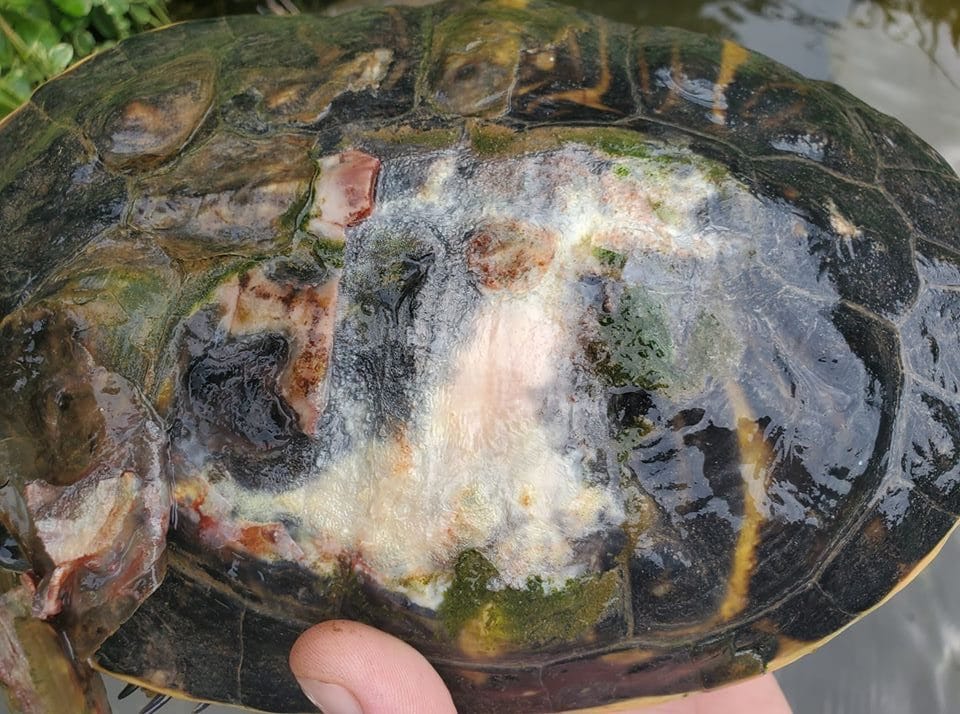
Recognizing Symptoms of Turtle Illness
Behavioral Changes
Turtles, by nature, are quite subtle when it comes to showing signs of illness. Behavioral shifts are often the first indicators that something might be wrong. If your usually active turtle becomes lethargic or starts hiding more than usual, it could be a sign of stress or an underlying health issue. Another red flag is a sudden loss of appetite. Turtles refusing to eat for more than a couple of days should be monitored closely. Keep an eye out for buoyancy problems too, like floating sideways, which can suggest a health problem.
Physical Symptoms
Physical changes in turtles can be quite telling. Look for any swelling, especially around the joints or eyes, as this can indicate infections or injuries. Discharge from the eyes, nose, or mouth is another warning sign that your turtle might be unwell. Skin issues, such as discoloration or peeling, can also signal health problems. Shell problems are particularly concerning; soft spots or cracks might suggest metabolic bone disease or shell rot.
Respiratory Issues
Respiratory problems in turtles are not uncommon and can be serious if not treated promptly. Wheezing, gasping, or labored breathing are classic symptoms of respiratory infections. If you notice your turtle breathing with its mouth open or hear unusual sounds when it breathes, it’s time to consult a vet immediately. These issues often need urgent care to prevent further complications.
Always remember that turtles are experts at hiding illness. Regular observation and a keen eye for changes are your best tools to catch problems early.
For more detailed guidance on turtle care, including recognizing these symptoms and more, refer to this comprehensive guide.

Preventing Common Turtle Diseases
Proper Nutrition
Feeding your turtle the right diet is essential to avoid health issues. Turtles need a balanced diet that includes proteins, vegetables, and calcium. Juveniles require more protein than adults, so feed them daily, while adults can be fed every 2-3 days. Calcium is crucial for a strong shell and bones, so provide a supplement 2-3 times a week. Also, include a multivitamin once a week for balanced nutrition.
- Juveniles: Feed daily with a higher protein content.
- Adults: Feed every 2-3 days.
- Calcium Supplementation: 2-3 times per week.
- Multivitamins: Once a week.
Adequate Lighting
Lighting plays a vital role in your turtle’s health. Turtles need both UVA and UVB light to metabolize calcium and maintain healthy bones. Without proper UVB lighting, turtles can develop metabolic bone disease, which is preventable by ensuring they have access to both natural sunlight or artificial UVB lighting.
- UVA and UVB Lighting: Essential for calcium absorption.
- Natural Sunlight: If possible, allow your turtle some time in natural sunlight.
- Artificial UVB Lighting: Ensure your turtle’s habitat includes a UVB light source.
Clean Habitat
A clean environment is key to preventing diseases like shell infections and respiratory issues. Turtles are messy, and their tanks need regular maintenance. Use a filter rated for double the tank size to manage waste and keep the water clean. Regular water changes are necessary to maintain water quality.
- Filtration: Use a filter rated for double the tank size.
- Water Changes: Change 25-50% of the water weekly.
- Complete Cleaning: Perform a full tank cleaning monthly.
Maintaining a clean and well-lit environment, along with a nutritious diet, can significantly reduce the risk of common turtle diseases. Consistent care and attention to their needs help ensure your turtle remains healthy and happy.

Treating Common Turtle Diseases
Turtles, like any other pets, can fall ill, and knowing how to treat them is crucial for their recovery. Below, we delve into the key aspects of treating common turtle diseases.
Veterinary Care
When your turtle shows signs of illness, such as lethargy or loss of appetite, the first step is to consult a veterinarian. Finding a vet who specializes in reptiles is essential, as they are more familiar with the unique medical needs of turtles. Regular checkups can help catch issues early, preventing more serious health problems down the line. A vet can provide accurate diagnoses and prescribe appropriate treatments, whether it’s medication for infections or dietary adjustments.
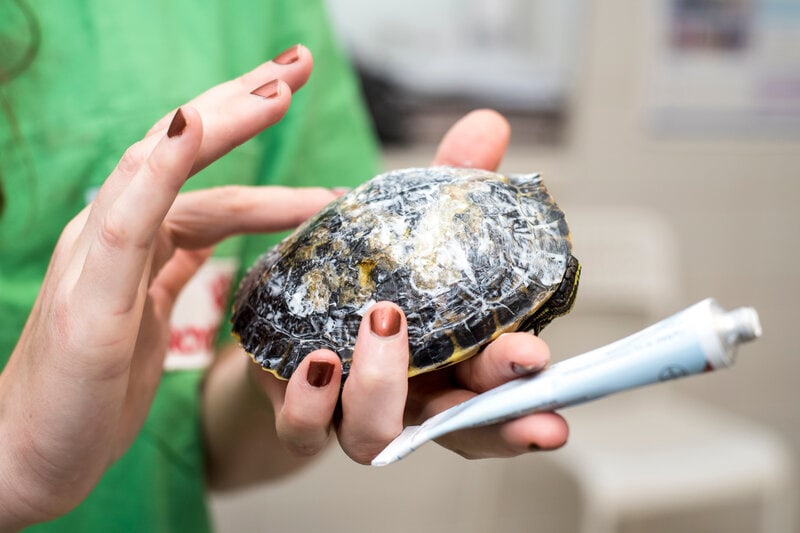
Home Remedies
While professional care is vital, some minor ailments can be managed at home. For instance, if your turtle has a mild shell infection, cleaning the shell with a diluted antiseptic solution can help. Increasing the turtle’s exposure to natural sunlight or UVB light can also aid in recovery from conditions like metabolic bone disease. However, always consult with a vet before trying home remedies to ensure they’re safe and suitable for your turtle’s specific condition.
Long-term Management
Chronic conditions require ongoing care and adjustments in your turtle’s living environment. For turtles recovering from illnesses like respiratory infections, maintaining a clean habitat with proper temperature and humidity levels is crucial. Adjusting their diet to include more vitamin-rich foods can prevent deficiencies and strengthen their immune system. Consistent monitoring of your turtle’s health and behavior is necessary to manage long-term conditions effectively.
Creating a supportive environment and staying informed about caring for turtles can significantly enhance your turtle’s quality of life. Regular veterinary visits and attentive home care are key to ensuring they thrive.
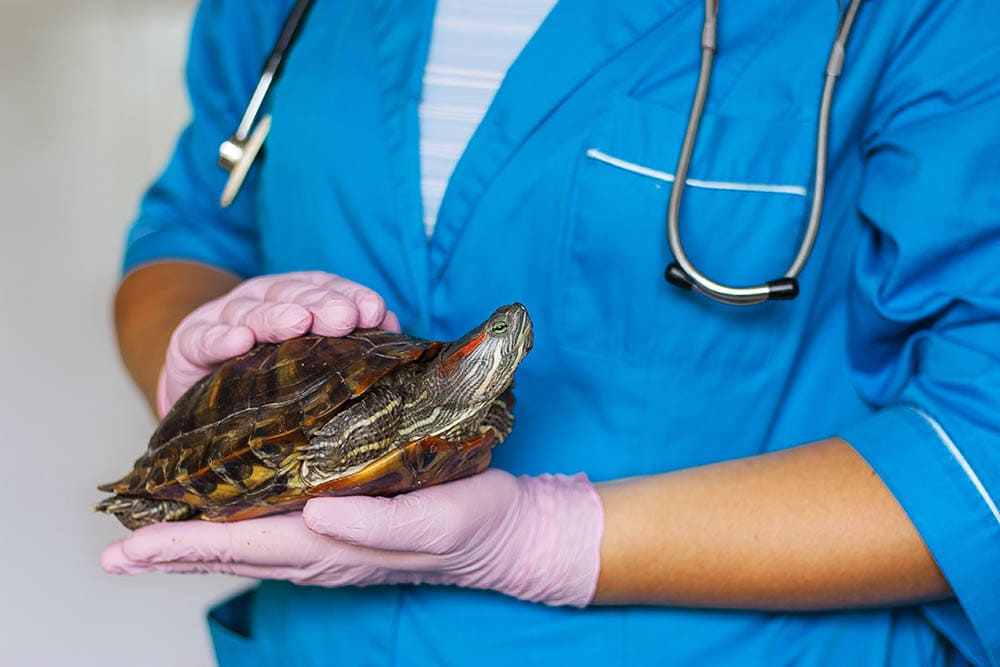
The Importance of Regular Veterinary Checkups
Regular veterinary checkups are a cornerstone of good turtle care. These visits are not just about addressing illnesses when they arise but are essential for maintaining overall health and preventing potential problems.
Annual Exams
Every turtle owner should prioritize annual exams for their shelled companions. During these exams, the vet will thoroughly check your turtle’s mouth, eyes, ears, and overall body condition. This annual checkup is crucial for catching early signs of illness that you might not notice at home. The vet might also recommend bringing in a fecal sample to test for parasites, which can often go unnoticed but have significant health impacts.
Finding a Reptile Specialist
Not every vet is equipped to handle turtles, so it’s important to find one who specializes in reptiles. A specialist will have the necessary expertise to spot issues specific to turtles and advise you on the best care practices. You can use directories, like those from the Association of Reptilian and Amphibian Veterinarians, to locate a qualified vet near you.
Monitoring Health Changes
Regular checkups help in monitoring any changes in your turtle’s health over time. Vets can keep track of weight, shell condition, and other vital indicators. This ongoing monitoring is key to catching problems early and adjusting care routines as needed. It’s also a great opportunity to discuss any behavioral changes you’ve noticed at home with a professional.
Regular vet visits are not just about treating diseases but are a proactive way to ensure your turtle leads a long and healthy life. A small investment in time and resources can make a big difference in your pet’s well-being.
For those considering owning a turtle, understanding the commitment involved, including regular checkups, is essential. With proper care and environment, turtles can become rewarding long-term companions.
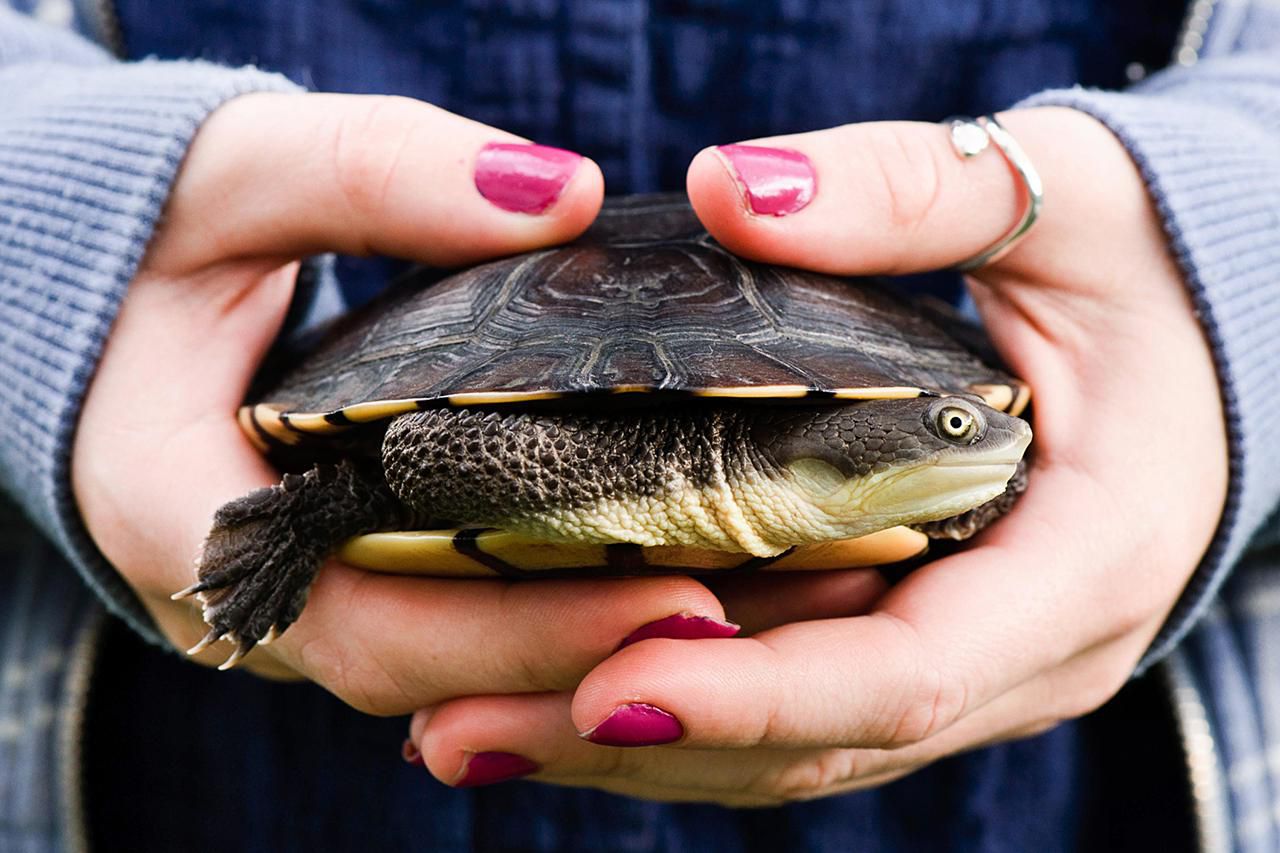
Creating a Healthy Environment for Turtles
Water Quality
Keeping your turtle’s water clean is a big deal. Dirty water can lead to all sorts of health problems, like shell infections and respiratory issues. Invest in a good-quality filter to manage the waste turtles produce. You should also change 10-20% of the water weekly and do a full change every couple of weeks. Don’t forget to use a dechlorinator to remove harmful chemicals from tap water. Regular testing for pH, ammonia, and nitrates is a smart move.
Basking and Lighting
Turtles love a good basking spot to dry off and soak up some rays. This helps them regulate their body temperature and absorb essential UVB rays. Set up a basking area with a temperature between 85-95°F. Use a basking bulb or ceramic heater for warmth. Ensure your turtle can easily access this spot. Lighting is crucial, too. Provide 10-12 hours of UVB light daily to help them synthesize vitamin D3 and absorb calcium. Replace UVB bulbs every 6-12 months because they lose effectiveness over time.
Dietary Needs
A balanced diet is key to keeping your turtle healthy. They need a mix of commercial pellets, leafy greens, and proteins. High-quality commercial turtle pellets should make up the bulk of their diet. Add in some kale, collard greens, and dandelion leaves. Throw in veggies like carrots and bell peppers. Occasionally, offer insects, worms, or small fish as treats. Remember, overfeeding can be harmful, so keep an eye on portion sizes.
Creating a healthy environment for your turtle is more than just setting up a tank. It’s about maintaining a balance between clean water, proper lighting, and a nutritious diet. Your turtle’s well-being depends on it.
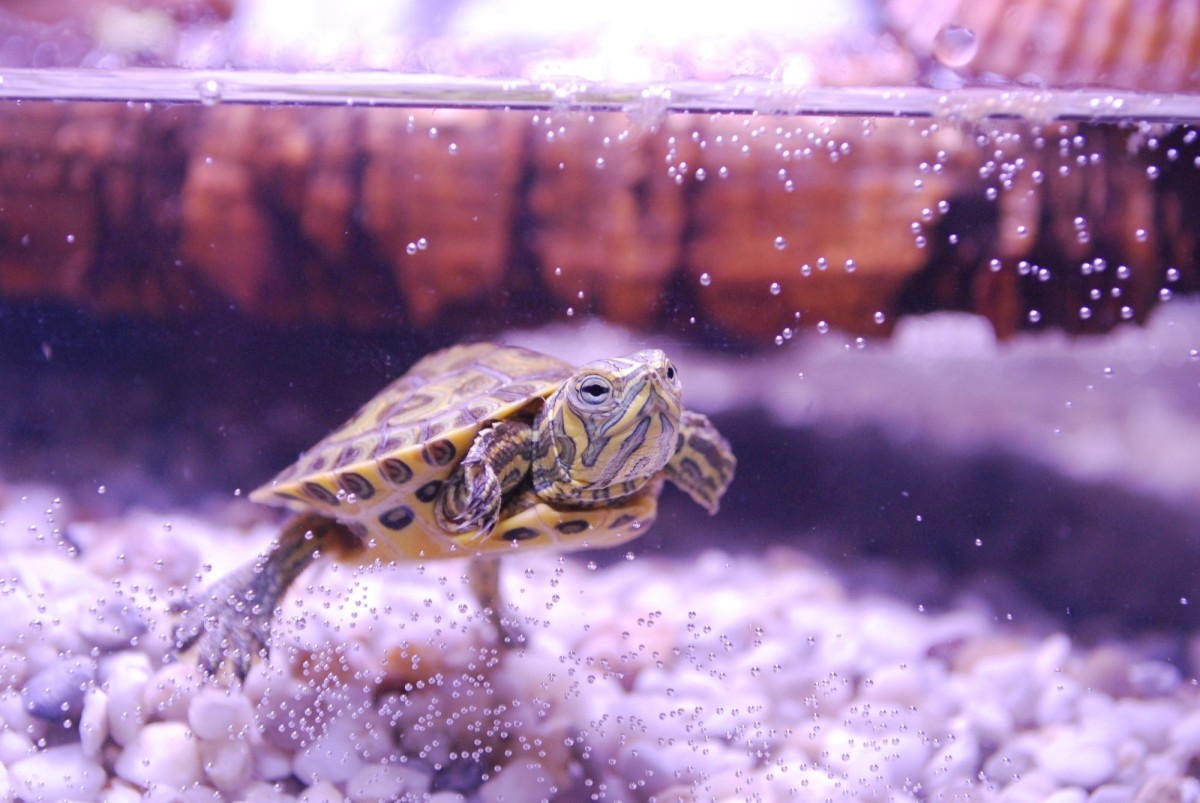
Handling and Hygiene Practices
Safe Handling Techniques
Handling turtles with care is essential to avoid stress and injury, both for the turtle and the handler. When picking up your turtle, always use both hands to support its body from underneath, including its legs. This helps prevent accidental drops or escapes, which could result in serious injury even from a short fall. Remember, turtles are not fond of frequent handling, so it’s best to keep it to a minimum to reduce stress and the risk of bites. Always lift your turtle by the midsection, not by the legs or tail, to ensure their safety.
Preventing Salmonella
Turtles can carry Salmonella bacteria, posing a risk to human health. It’s crucial to wash your hands thoroughly before and after handling your turtle or cleaning their habitat. Be especially cautious around children and immunosuppressed individuals, as they are more susceptible to serious illness from Salmonella exposure. Consider supervising children when they interact with turtles to ensure they follow proper hygiene practices.
Cleaning the Habitat
A clean habitat is key to a healthy turtle. Daily cleaning of waste and uneaten food, alongside regular deep cleaning, helps prevent bacteria growth. Effective waste management and a good filtration system are vital for maintaining a healthy environment. When setting up your turtle’s home, opt for safe decorations that won’t harm your pet. Regularly check and maintain water quality to prevent shell infections and other health issues.
Keeping your turtle’s environment clean not only protects them from diseases but also ensures they live a happy and healthy life. It’s a small effort that makes a big difference in their well-being.

Conclusion
Owning a turtle is more than just having a pet; it’s a commitment to providing a healthy and safe environment for a creature that can live for decades. From ensuring they have the right diet and lighting to keeping their habitat clean, there’s a lot to consider. But don’t let that scare you off. With the right care and attention, your turtle can thrive and become a cherished part of your family. Remember, regular vet checkups are key, and always be on the lookout for any signs of illness. By staying informed and proactive, you can help your turtle lead a long, happy life. So, take the time to learn and enjoy the rewarding experience of being a turtle owner.
Frequently Asked Questions
How often should I clean my turtle’s tank?
You should change a part of the water, about 10-20%, every week. Every 2-3 weeks, do a full water change to keep the water clean and healthy for your turtle.
What is the best diet for my turtle?
A healthy turtle diet includes turtle pellets, leafy greens, veggies, and sometimes treats like small insects or fish.
What signs show that my turtle might be sick?
If your turtle is acting tired, not eating, has swollen areas, or is having trouble breathing, it might be sick and should see a vet.
Do turtles need special lighting?
Yes, turtles need UVB light for about 10-12 hours each day. This helps them make vitamin D3, which is important for strong bones.
Can turtles spread diseases to humans?
Yes, turtles can carry germs like Salmonella. Always wash your hands well after touching your turtle or cleaning its tank.
Why are regular vet visits important for turtles?
Regular vet checkups help catch any health problems early and make sure your turtle stays healthy.







